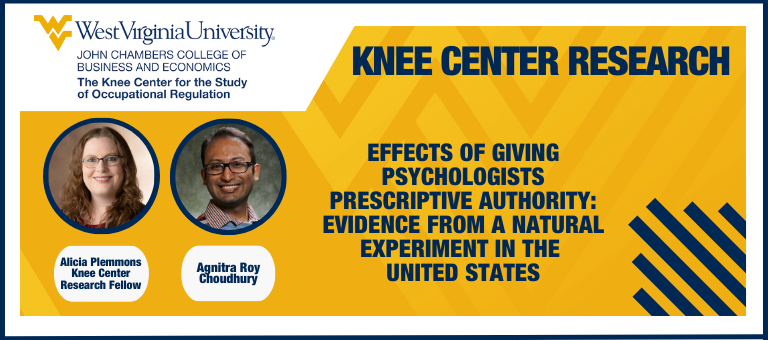Effects of giving psychologists prescriptive authority: Evidence from a natural experiment in the United States

Universal Recognition: Labor Market Effects and Best Practices for Policymakers
May 23, 2023
Certificate of Need Research Conference – 2023
June 12, 2023Background
Suicide is the tenth leading cause of death in the U.S. Six states have granted psychologists prescriptive authority to address shortages in the provision of behavioral and mental health care services to increase provider access to pharmacological interventions using psychotropic medications.
Methods
This study estimates the impact of expanding scope of practice for specifically trained psychologists to include pharmacological interventions on mortality by self-inflicted injury in the U.S. by using the implementation of prescriptive authority for psychologists in New Mexico and Louisiana as a natural experiment using a staggered different-in-difference estimation. Additional robustness tests are conducted to identify heterogenous treatment effects, observe sensitivity of our results for Medicaid expansion, and to compare other forms of mortality that should not have been affected by psychologist prescriptive authority.
Introduction
Suicide, a global public health crisis, is the second leading cause of external mortality in European countries [1] and one of the leading causes of death for individuals between the ages of 15 and 34 in the United States [[2], [3]]. Lack of behavioral and mental health care and poor management of clinical disorders are correlated with poor general health [4], low workplace productivity [5,6], and high suicide rates [7]. The loss of life to intentional self-harm is responsible for stagnant and declining life expectancy in many high-income countries [8].
While there are many factors that influence an individual’s choice to self-harm with the intention of suicide, several studies have identified strong associations between mental health issues, which may be partially managed through psychotropic medication interventions, such as major depressive disorder, and the risk of suicide [[9], [10], [11], [12]]. One pathway to address poor mental health conditions includes expanding the scope of practice for some behavioral and mental healthcare providers to include the prescriptive authority of psychotropic medication in conjunction with other services such as the development of treatment plans and talk therapy.
Many countries limit the ability to prescribe psychotropic medications to physicians and psychiatrists, while psychologists are only permitted to provide practice services such as diagnosing patients, providing talk therapy, and counseling. Using a natural experiment in the U.S., we find two states, New Mexico and Louisiana, decreased the most severe of behavioral and mental health outcomes, suicide, after expanding prescriptive authority for specifically trained psychologists. Using restricted mortality data provided by the National Center for Health Statistics, we analyze the impact of allowing trained psychologists to prescribe medication on suicide rates. We use a natural experiment setup with two states, New Mexico and Louisiana, granting prescriptive authority to doctoral-level psychologists that have completed graduate coursework in clinical psychopharmacology. We find that expanding psychologist scope of practice led to a 5 to 7 percentage point reduction in suicides among the population. These reductions were greatest for the subpopulations of men, individuals who are identified as white, married or single individuals, and people between the ages of 35 and 54.


